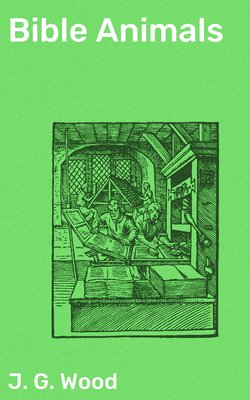Читать книгу Bible Animals - J. G. Wood - Страница 15
На сайте Литреса книга снята с продажи.
Оглавление"At evening let them return; and let them make a noise like a dog, and go round about the city. Let them wander up and down for meat, and grudge if they be not satisfied"—Psalm lix. 14, 15.
On the first night of his arrival, he could not sleep, and went to the window to look out in the night. "The noise I heard then I shall never forget. To say that if all the sheep-dogs, in going to Smithfield on a market-day, had been kept on the constant bark, and pitted against the yelping curs upon all the carts in London, they could have given any idea of the canine uproar that now first astonished me, would be to make the feeblest of images. The whole city rang with one vast riot. Down below me, at Tophané—over-about Stamboul—far away at Scutari—the whole sixty thousand dogs that are said to overrun Constantinople appeared engaged in the most active extermination of each other, without a moment's cessation. The yelping, howling, barking, growling, and snarling, were all merged into one uniform and continuous even sound, as the noise of frogs becomes when heard at a distance. For hours there was no lull. I went to sleep, and woke again, and still, with my windows open, I heard the same tumult going on; nor was it until daybreak that anything like tranquillity was restored.
"Going out in the daytime, it is not difficult to find traces of the fights of the night about the limbs of all the street dogs. There is not one, among their vast number, in the possession of a perfect skin. Some have their ears gnawed away or pulled off; others have their eyes taken out; from the backs and haunches of others perfect steaks of flesh had been torn away; and all bear the scars of desperate combats.
"Wild and desperate as is their nature, these poor animals are susceptible of kindness. If a scrap of bread is thrown to one of them now and then, he does not forget it; for they have, at times, a hard matter to live—not the dogs amongst the shops of Galata or Stamboul, but those whose 'parish' lies in the large burying-grounds and desert places without the city; for each keeps, or rather is kept, to his district, and if he chanced to venture into a strange one, the odds against his return would be very large. One battered old animal, to whom I used occasionally to toss a scrap of food, always followed me from the hotel to the cross street in Pera, where the two soldiers stood on guard, but would never come beyond this point. He knew the fate that awaited him had he done so; and therefore, when I left him, he would lie down in the road, and go to sleep until I came back.
"When a horse or camel dies, and is left about the roads near the city, the bones are soon picked very clean by these dogs, and they will carry the skulls or pelves to great distances. I was told that they will eat their dead fellows—a curious fact, I believe, in canine economy. They are always troublesome, not to say dangerous, at night; and are especially irritated by Europeans, whom they will single out amongst a crowd of Levantines."
In the same work there is a short description of a solitary dervish, who had made his home in the hollow of a large plane-tree, in front of which he sat, surrounded by a small fence of stakes only a foot or so in height. Around him, but not venturing within the fence, were a number of gaunt, half-starved dogs, who prowled about him in hopes of having an occasional morsel of food thrown to them. Solitary as he was, and scanty as must have been the nourishment which he could afford to them, the innate trustfulness of the dog-nature induced them to attach themselves to human society of some sort, though their master was one, and they were many—he was poor, and they were hungry.
Once in the Scriptures the word Greyhound occurs, namely, in Prov. xxx. 29–31: "There be three things which go well, yea, four are comely in going: a lion, which is strongest among beasts, and turneth not away for any; a greyhound; an he-goat also; and a king, against whom there is no rising up." But the word "Greyhound" is only employed conjecturally, inasmuch as the signification of the Hebrew word Zarzir-mathnâim is "one girt about the loins." Some commentators have thought that the horse might be signified by this word, and that the girding about the loins referred to the trappings with which all Easterns love to decorate their steeds. Probably, however, the word in question refers neither to a horse nor a dog, but to a human athlete, or wrestler, stripped, and girt about the loins ready for the contest.
